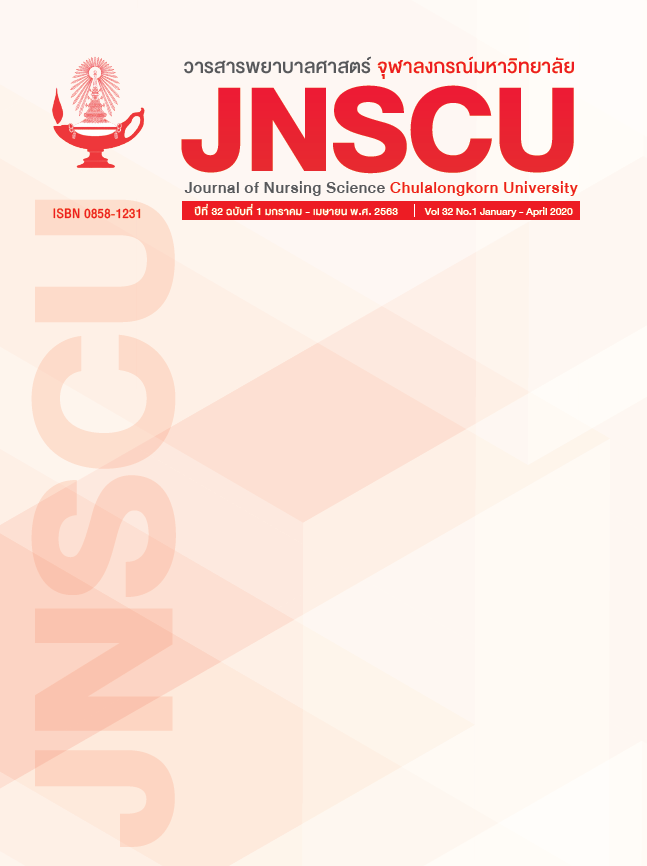การทบทวนงานวิจัยอย่างเป็นระบบเกี่ยวกับวิธีการพยาบาลเพื่อดูแลสตรีตั้งครรภ์ ภายหลังสูญเสียทารกในระยะปริกำเนิด
คำสำคัญ:
การทบทวนงานวิจัยอย่างเป็นระบบ/ สตรีตั้งครรรภ์/ สูญเสียทารกในระยะปริกำเนิดบทคัดย่อ
บทคัดย่อ
วัตถุประสงค์: เพื่อศึกษาอย่างเป็นระบบงานวิจัยที่เกี่ยวกับวิธีการพยาบาลสตรีตั้งครรภ์ที่สูญเสียทารกในระยะปริกำเนิด
รูปแบบงานวิจัย: การทบทวนงานวิจัยอย่างเป็นระบบโดยใช้กรอบ PICO
วิธีดำเนินการวิจัย: ประชากรเป็นงานวิจัยและเอกสารทางวิชาการที่ได้รับการตีพิมพ์ทั้งในประเทศไทยและต่างประเทศ ซึ่งเน้นในเรื่องวิธีการพยาบาลสตรีที่สูญเสียบุตรในระยะคลอดทั้งครรภ์แรกและครรภ์หลัง เครื่องมือที่ใช้ในการวิจัยได้แก่ แบบการประเมินคุณภาพของงานวิจัยชื่อ Newcastle-Ottawa Quality Assessment Scales และแบบบันทึกข้อมูลงานวิจัย เก็บรวบรวมข้อมูลโดยการสืบค้นเอกสารที่ตรงตามเกณท์การคัดเลือก วิเคราะห์ข้อมูลเชิงคุณภาพโดยวิธี content analysis
ผลการศึกษา: ผลการสืบค้นพบงานวิจัยฉบับสมบูรณ์ที่มีคุณสมบัติตามเกณท์การคัดเลือกจำนวน 15 เรื่อง แบ่งตามประเภทการสูญเสียเป็น 3 ประเภทคือ ร้อยละ 73.33 เป็นงานวิจัยที่เกี่ยวกับการแท้งเอง ร้อยละ 6.67 เป็นงานวิจัยที่เกี่ยวกับการยุติการตั้งครรภ์ และร้อยละ 20.00 เป็นงานวิจัยที่เกี่ยวกับการตายคลอด ส่วนการพยาบาลเป็นเรื่องเกี่ยวกับการเตรียมความพร้อมของพยาบาลในการให้คำปรึกษาและการให้ข้อมูลที่จำเป็นรวมทั้งการสนับสนุนสตรีตั้งครรภ์ที่สูญเสียทารกในระยะปริกำเนิดและครอบครัว
สรุป: พยาบาลและผดุงครรภ์ที่ดูแลสตรีตั้งครรภ์ภายหลังสูญเสียทารกในระยะปริกำเนิดควรได้รับการอบรมเกี่ยวกับทักษะการให้คำปรึกษา การให้ข้อมูลที่จำเป็นและการสนับสนุนทางอารมณ์
เอกสารอ้างอิง
2. WorldBank. Thailand: Infant mortality rate from 2007 to 2017 (in deaths per 1,000 live births) 2019 [updated (April 24, 2019); cited 2019 November 7]. Available from: https://www.statista.com/statistics/807810/infant-mortality-in-thailand/.
3. Armstrong DS. Emotional distress and prenatal attachment in pregnancy after perinatal loss. Journal of nursing scholarship : an official publication of Sigma Theta Tau International Honor Society of Nursing. 2002;34(4):339-45.
4. DiMarco MA, Menke EM, McNamara T. Evaluating a support group for perinatal loss. MCN The American journal of maternal child nursing. 2001;26(3):135-40.
5. Callister LC. Perinatal loss: a family perspective. The Journal of perinatal & neonatal nursing. 2006;20(3):227-34; quiz 35-6.
6. Davies R. New understandings of parental grief: literature review. Journal of advanced nursing. 2004;46(5):506-13.
7. Radestad I, Nordin C, Steineck G, Sjogren B. Stillbirth is no longer managed as a nonevent: a nationwide study in Sweden. Birth (Berkeley, Calif). 1996;23(4):209-15.
8. Talbot K. What Forever Means After the Death of a Child: Transcending the Trauma, Living with the Loss: Taylor & Francis; 2013.
9. Adolfsson A, Larsson PG, Wijma B, Bertero C. Guilt and emptiness: women's experiences of miscarriage. Health care for women international. 2004;25(6):543-60.
10. Najman JM, Vance JC, Boyle F, Embleton G, Foster B, Thearle J. The impact of a child death on marital adjustment. Social Science & Medicine. 1993;37(8):1005-10.
11. Lundqvist A, Nilstun T, Dykes AK. Neonatal end-of-life care in Sweden: the views of Muslim women. The Journal of perinatal & neonatal nursing. 2003;17(1):77-86.
12. Stiffler D, Birch N, Campbell H, Cullen D. A Synthesis of Coping Experiences After Infant Death. Holistic nursing practice. 2017;31(2):118-25.
13. Redman C. Counselling in perinatal loss. British Journal of Midwifery. 2003;11(12):731-4.
14. Robinson M, Baker L, Nackerud L. The relationship of attachment theory and perinatal loss. Death studies. 1999;23(3):257-70.
15. Wing DG, Burge-Callaway K, Rose Clance P, Armistead L. Understanding gender differences in bereavement following the death of an infant: Implications of or treatment. Psychotherapy: Theory, Research, Practice, Training. 2001;38(1):60-73.
16. Caelli K, Downie J, Letendre A. Parents' experiences of midwife-managed care following the loss of a baby in a previous pregnancy. Journal of advanced nursing. 2002;39(2):127-36.
17. Lilford RJ, Stratton P, Godsil S, Prasad A. A randomised trial of routine versus selective counselling in perinatal bereavement from congenital disease. British journal of obstetrics and gynaecology. 1994;101(4):291-6.
18. Murray JA, Terry DJ, Vance JC, Battistutta D, Connolly Y. Effects of a program of intervention on parental distress following infant death. Death studies. 2000;24(4):275-305.
19. Larson DG, Hoyt WT. What has become of grief counseling? An evaluation of the empirical foundations of the new pessimism. Professional Psychology: Research and Practice. 2007;38(4):347-55.
20. Schneiderman G, Winders P, Tallett S, Feldman W. Do child and/or parent bereavement programs work? The Canadian Journal of Psychiatry / La Revue canadienne de psychiatrie. 1994;39(4):215-8.
21. Smyth RL, Craig JV. Evidence-Based Practice Manual for Nurses - E-Book: Elsevier Health Sciences; 2011.
22. Melnyk BM, Fineout-Overholt E. Key steps in implementing evidence-based practice: asking compelling, searchable questions and searching for the best evidence. Pediatric nursing. 2002;28(3):262-3, 6.
23. Wells G, Shea B, O'Connell D, Peterson J, Welch V, Losos M, et al. The Newcastle-Ottawa Scale (NOS) for assessing the quality of nonrandomised studies in meta-analyses 2008 [
24. DiMarco M, Renker P, Medas J, Bertosa H, Goranitis JL. Effects of an educational bereavement program on health care professionals' perceptions of perinatal loss. Journal of continuing education in nursing. 2002;33(4):180-6.
25. Ramsden CA. Miscarriage counselling--an accident and emergency perspective. Accident and emergency nursing. 1995;3(2):68-73.
26. Sereshti M, Nahidi F, Simbar M, Ahmadi F, Bakhtiari M, Zayeri F. Mothers' Perception of Quality of Services from Health Centers after Perinatal Loss. Electronic physician. 2016;8(2):2006-17.
27. Johnson O, Langford RW. Proof of life: a protocol for pregnant women who experience pre-20-week perinatal loss. Critical care nursing quarterly. 2010;33(3):204-11.
28. Swanson KM. Effects of caring, measurement, and time on miscarriage impact and women's well-being. Nursing research. 1999;48(6):288-98.
29. Johnson O, Langford R. Proof of Life: A Protocol for Pregnant Women Who Experience Pre-20-Week Perinatal Loss. Crit Care Nurs Q. 2010;33(3):204.
30. DiMarco MA, Menke EM, McNamara T. Evaluating a Support Group for Perinatal Loss. MCN, the American Journal of Maternal Child Nursing. 2001;26(3):135-41.
31. Sanchez NA. Mothers' Perceptions of Benefits of Perinatal Loss Support Offered at a Major University Hospital. The Journal of Perinatal Education. 2001 10(2):23–30.
32. Cacciatore J, Radestad I, Frederik Froen J. Effects of contact with stillborn babies on maternal anxiety and depression. Birth (Berkeley, Calif). 2008;35(4):313-20.
33. Erlandsson K, Warland J, Cacciatore J, Rådestad I. Seeing and holding a stillborn baby: Mothers' feelings in relation to how their babies were presented to them after birth—Findings from an online questionnaire. Midwifery. 2013;29(3):246-50.
34. Caelli K, Downie J, Letendre A. Parents' experiences of midwife-managed care following the loss of a baby in a previous pregnancy. J Adv Nurs. 2002;39(2):127-36.
35. Munson D, Leuthner SR. Palliative care for the family carrying a fetus with a life-limiting diagnosis. Pediatric clinics of North America. 2007;54(5):787-98, xii.
36. Geerinck-Vercammen CR, Kanhai HHH. Coping with termination of pregnancy for fetal abnormality in a supportive environment. Prenatal Diagnosis. 2003;23(7):543-8.
เผยแพร่แล้ว
ฉบับ
ประเภทบทความ
สัญญาอนุญาต
ลิขสิทธิ์ (c) 2021 วารสารพยาบาลศาสตร์ จุฬาลงกรณ์มหาวิทยาลัย

อนุญาตภายใต้เงื่อนไข Creative Commons Attribution-NonCommercial-NoDerivatives 4.0 International License.
##default.contextSettings.thaijo.licenseTerms##


